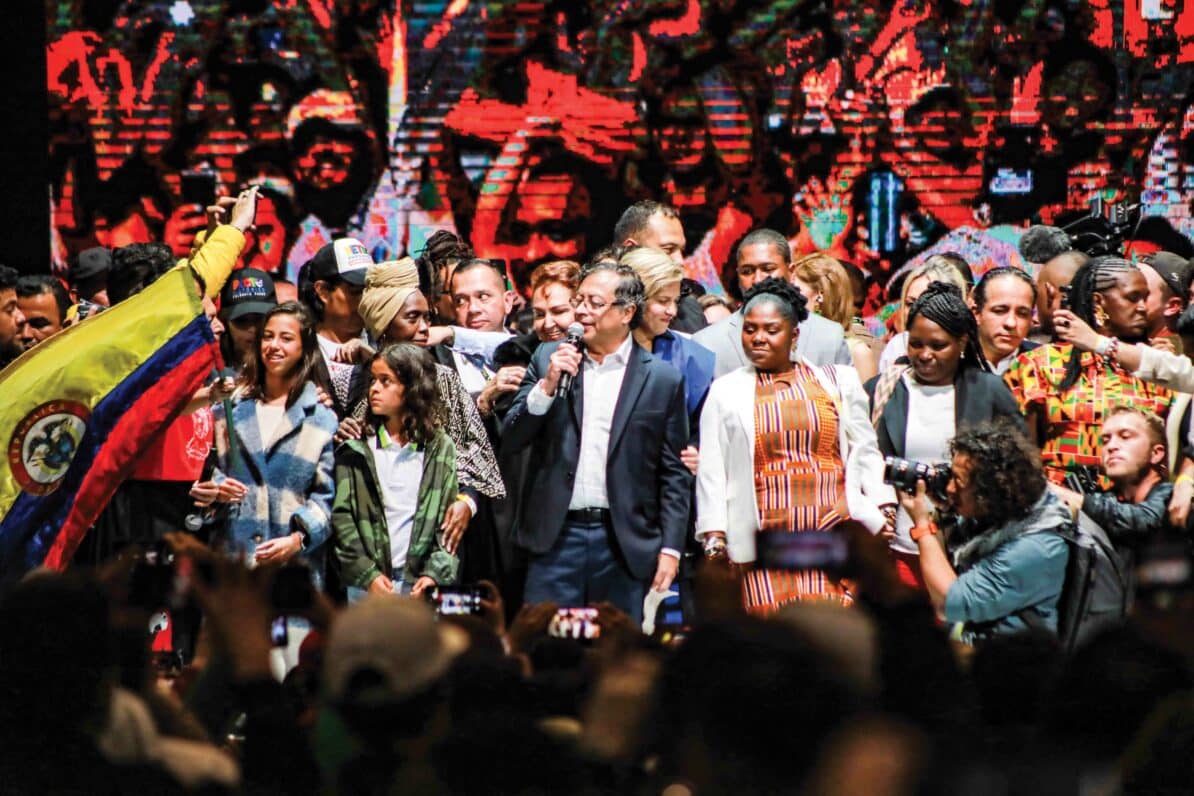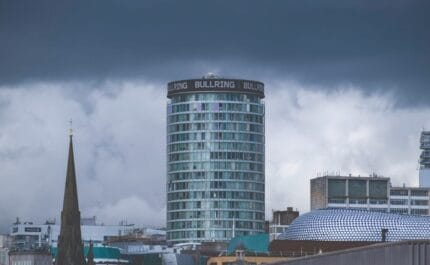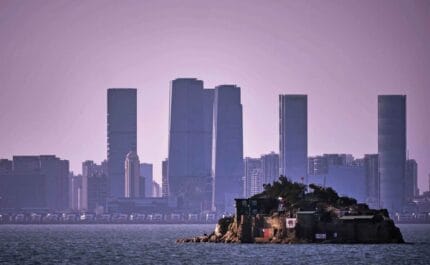Moment that mattered: Colombia elects its first left wing government
In 2022 we spoke to activist and advocate Erlendy Cuero on her hopes for a new era for Colombia

President-elect Gustavo Petro and vice president Francia Márquez address supporters in Bogotá, Colombia, shortly after their victory is announced, 19th June 2022. Photo: Alexa Rochi/ALDÍA News via Getty Images
19th June 2022 (Taken from: #47)
On 19th June 2022 Gustavo Petro, an economist and former mayor who was also a member of a leftist urban guerrilla group, M-19, in his youth, was swept to power in Colombia on a manifesto of transformation, social justice and peace.
“When I heard the result, I was in a community centre with a group who’d been counting the votes: we all just started hugging and shouting, ‘Sí, se puede!’ – ‘yes, it can be done’,” says Erlendy Cuero, laughing with joy as she recalls the victory. “The first thing which came into my head was [that] we had changed history. I felt a real sense of peace and hope.”
Cuero is an activist and advocate for displaced Afro-Colombian people and works in the southwestern city of Cali, a hub of civil action and protest. She campaigned for Petro, who defeated 77-year-old populist Rodolfo Hernández by a comfortable margin to become the country’s first leftwing president.
Cuero says that the election was an opportunity for representation, not just from Petro, who promised change and inclusion, but more importantly from a vice-presidential candidate, Francia Márquez, who represented parts of Colombia which are often absent from mainstream politics – what Cuero describes as “the other Colombia”. Cali’s concrete walls have been plastered with new brightly-painted murals of Márquez, most of them depicting her in her trademark power-pose, fist raised. She is now vice-president of Colombia, the first Afro-Colombian woman ever to take the role – and a hero in this city, where she has spent much of her life.
The presidential campaign was run – and won – on change, but Petro is not so dissimilar from the elite, urban, mostly white men who have governed Colombia for centuries. Márquez, on the other hand, is a radical departure from the status quo. Cuero says many were inspired to vote not by Petro, but by Márquez. “We voted for Francia… a woman of the people who can unite the two Colombias,” she says.
Colombia suffers from one of the highest levels of income and wealth inequality on the planet and many citizens do not vote, due to distrust in the political system or to the logistical challenges of reaching polling stations from densely forested or mountainous parts of the country. This year, however, people came from the remotest parts of Colombia to vote: many had to walk for hours, arrive on horseback, calculate the tides to arrive by boat, or set off the day before to make it on time. The elections saw the highest turnout in years, with major spikes in voter turnout registered across the Pacific and Caribbean regions of Colombia, which have large Afro-Colombian populations.
Community groups organised buses and walking groups to polling stations. Campaigners like Cuero went to remote places to speak to people about the upcoming elections, while others collected ingredients and donations to prepare communal stews for those who made the journey. Workers’ unions provided petrol for motorbike taxis and motorboats to collect those in the furthest flung areas. “There have been two particular moments of awakening over the last couple of years,” says Cuero, explaining why 2022 saw voters go to such lengths. “The first was the pandemic, which brought the divides of inequality into the light. The second was the national strike of 2021 – seeing our indifferent government, giving orders to attack and kill young people just for demanding their rights. It was time for the Other Colombia to rise up – it was time for the people to decide to change their reality.”
Márquez herself was born in the ‘Other Colombia’ Cuero speaks of, in the northern town of Yolombó, Cauca, a part of the country long plagued by violence and armed groups. At 16 she became a single mother, and began to pan for gold in the nearby Orejas River to support her family. When her livelihood – and that of many in the area – was threatened by pollution from mining, Márquez found herself propelled into activism, petitioning and campaigning to protect Colombia’s environment from extractive industries. Because of her activism, armed groups made an attempt on her life which forced her to leave her home for good. Colombia is, year after year, the country with the most activist killings in the world – 138 human rights defenders were murdered last year.
Having Francia in government sends a message of hope… Our kids will see themselves differently now”
Márquez went to study law in Cali, taking jobs as a domestic worker to get by. At 38 years old she graduated with an award-winning thesis about structural racism. “They don’t have to tell Francia what it is to be a victim of violence and conflict, what it is to be discriminated against or suffer racism, to be revictimised even when fleeing violence. Colombia is a patriarchal and sexist country,” Cuero says, matter of factly. “It is a country where discrimination is our daily bread. Francia has lived all of that in her own flesh – from that experience, she can build real proposals to end those cycles.”
Much like Márquez, Cuero arrived in Cali from the nearby countryside, displaced by Colombia’s armed violence. “I was tired of carrying this story of pain, but also of not understanding what had happened to us, why we had lost loved ones, why we and our communities were faced again and again with these situations. In parts of this country, massacres can happen, children can go missing, and nothing is done – like we aren’t even human.” Colombia has the second highest number of internally-displaced people in the world, second only to Syria, and Cali is a destination for many of those fleeing violence in the countryside. Despite a much-hailed peace deal with the Farc guerrilla group in 2016, harmony still hasn’t reached many parts of Colombia, which still suffer under the occupation of armed forces. These are largely narco-militias who brutally control the territory they occupy. Recruitment of young people is routine, as are attacks on the population.
“As activists, Francia and I have encountered each other in moments of real pain – like after the Llano Verde massacre, when five Afro-Colombian teenagers were found tortured and murdered in Cali,” says Cuero. “We couldn’t keep burying people without doing anything about it. She has been an example of determination and force – but also an example of how much one person can change things. Activism in the community is important, but unless we reach positions of power like Francia, we will continue in our tears and our complaints without seeing real change. Having Francia in government sends a message of hope to young Afro-Colombian people – that it is possible, that we can attain power. Our kids will see themselves differently now.”
Márquez is determined to take more than a symbolic role: heading up the new ministry of equality, she has said that “This vice-presidency will not be an adornment. I am not a woman of adornment, I am a woman of struggle, dignity and justice.”
Cuero speaks with moving clarity about the importance of this election in the context of the country’s history of colonisation and enslavement. “There is a before and after. The before was a Colombia managed by descendants of slave-owners, a Colombia which was always centralised and run from Bogotá. This new Colombia is inclusive.”
“It wasn’t just the Afro-Colombian vote which won the election,” she continues. “It was all of the excluded communities of Colombia: the LGBTQ+ community, the rural communities, working class women, the young people, those who have felt excluded, in remote or abandoned parts of the country, many of whom had never come out to vote like that before.”
That inclusion and unity will be key to progress, says Cuero. Petro has spent the time since his election win forming legislative coalitions and appointing ministers from across the political spectrum. “Petro’s ‘Historic Pact’ coalition has also included parts of the political right – and that’s valid,” says Cuero. “We cannot go from extreme to extreme, dismissing the other side. It’s important to start to close the divides, to end the polarisation. Looking at Petro and Francia – they have pushed for inclusion, they are not telling the rich they can’t play a part. Let them be present, but let’s all talk – along with the people who don’t have drinking water, children without schools, people who don’t have bridges or roads. It’s a more complete look at the country.”
Expectations in Colombia are sky-high and promises have been grand. People across the country are expecting structural change, increased opportunities for land ownership, reproductive rights, new protections for the environment and access to education. Cuero is pragmatic about what the duo can implement over their four-year term. “We aren’t hoping to go from rain to sun overnight – the change has to come incrementally,” she says. “Of course there are things which are so urgent we want them right now, but it takes time. Petro and Francia only have four years, they cannot fix the historical problems of this country. But what they can do is open the door to change.”
Slow Journalism in your inbox, plus infographics, offers and more: sign up for the free DG newsletter. Sign me up
Thanks for signing up.








